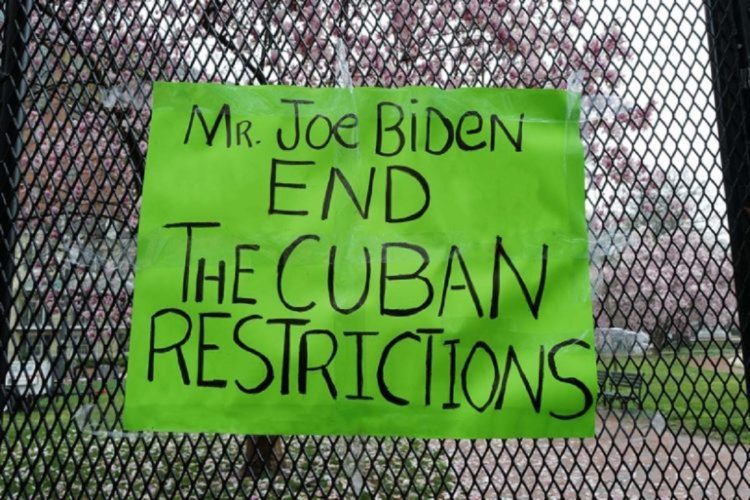With the 2024 election campaign in full swing, an alliance of U.S. and Cuban-American groups and activists published an open letter to President Joe Biden encouraging him to take a turn in his Cuba policy.
The letter speaks directly of the advantages of a rapprochement with the island by offering “the best chances of achieving some of the margins that you need to win, by receiving votes from one of the Latin American communities with the largest voter turnout.”
United Voice for Change: A Call to Revisit U.S.-Cuba Policy is the title of the appeal sponsored by Acere.
The group is the Alliance for Cuba Engagement and Respect ― Acere for its acronym in English ― a name that plays with the phonetics of asere, a Cubanism that belongs to the colloquial register and a word that for Cubans means friend, brother or partner.
“After several announcements, we are still waiting for measures that allow trade and investment with the island’s growing private sector. We also hope to achieve unlimited freedom to travel to Cuba, as is the case with other countries that are really dangerous,” the petitioners state.
Signed by more than fifty organizations and more than two hundred individuals based in the United States, the document resolutely calls for removing the island from the list of nations that help or sponsor terrorism, according to the State Department.
This is an “unfounded” and “disconcerting” measure that “hinders access to the basic goods of daily life, financial operations and digital platforms. It also greatly undermines our national efforts to combat terrorism around the world,” the signatories of the letter said.
In 2015, former President Barack Obama removed Cuba from the list on which it had appeared since 1982. This was a critical step in the thaw between both countries, which led to the historic reestablishment of diplomatic relations, broken by Washington in January 1961.
Obama’s rapprochement was reversed by the administration of Donald Trump, who re-entered the island on the list of terrorists before leaving the White House at the beginning of 2021. His successor, Democrat Biden, has maintained that status despite contrary opinions from inside and outside the United States.
ONU: lista de EEUU sobre países patrocinadores del terrorismo socava derechos humanos
“Financial institutions will have another reason to avoid operations with Cuba,” John Kavulich, president of the United States-Cuba Economic and Trade Council, based in New York, told the BBC Mundo portal in 2021.
“And there will be greater scrutiny in operations with Cuba, which will result in fewer governments and companies wanting to have a relationship with the island,” Kavulich said.
The letter recalls that the sanctions have precipitated a humanitarian crisis on the island, which, in turn, is pumping pressure towards “an unprecedented immigration crisis,” because “tens of thousands of Cubans have lost hope and have left their homeland in search of economic stability.”
The Cuban economy is suffering from recession, amid attempts to control a runaway wave of inflation and other evils through a reform that has not achieved the stabilization and coherence necessary to dismantle structural dysfunctions.
“Those who remain in Cuba — including the growing private sector that your Administration claims to support — see their livelihoods severely affected by these sanctions that you could easily roll back,” the signatories tell Biden.
Cuban entrepreneurs address Biden: “We ask again that you listen to us”
Despite overcoming a path of pitfalls and internal hesitations, the private sector has already managed to accumulate more than 10,000 micro, small and medium-sized enterprises since its approval in October 2021, and around 580,000 workers are employed in non-state forms of management, one sixth of the active workforce.
Already in October 2021, the Acere alliance made a first public petition to President Biden to delete Cuba’s name from the list of State sponsors of terrorism.
One of the signatories then was Oniel Díaz Castellanos, co-founder of the Auge consultancy, a company that helps businesses grow amid the bureaucratic weeds prevailing in Cuba and the official zigzags around the private sector.
“With the sanctions and the blockade, the possibility of a prosperous and efficient economy will always be a distant horizon, even if economic reforms are implemented,” the expert estimated.
Between the first and second petition to the White House carried out by Acere, the issue of remittances, via Western Union, was one of the few advances granted by the current U.S. administration, which recently denied, for the moment, access to private businesspeople from the island to accounts in U.S. banks.
Washington no abrirá por ahora su sistema bancario a las mipymes cubanas
At Acere, some organizations work inspired by the values of their faith, while others help promote the interests of the business community or care about their right to travel freely to the island.
At the moment, Americans who wish to travel to Cuba have to obtain one of the twelve licenses issued by the Treasury Department’s Office of Foreign Assets Control (OFAC).
All Acere members uphold coalition principles and believe that compromise, rather than isolation and intervention, is the solution to promoting friendly neighborly relations between the two countries.
The signatories of the letter call on President Biden to get rid of a “failed policy” once and for all, urge him “in the strongest possible terms to not yield” to the attacks of the extreme right of Cuban origin and ask him for his “courage” to make decisions regarding the island.
Those decisions would contain, according to the alliance, “what most of the Cuban American community, and overwhelming majority of U.S. citizens and the world, believe is the right thing to do.”
In January, Democratic congressmen from the state of Massachusetts asked President Biden to remove Cuba from the list of sponsors of terrorism, according to The Hill newspaper.
Since 1992, after the Cold War ended, the United Nations General Assembly adopted, at the request of Havana, a resolution condemning the embargo/blockade of Cuba.
Since then, an overwhelming vote has demanded, year after year, an end to the sanctions. But Washington has turned a deaf ear until now.
The signatures will be collected until the end of February, and then sent to President Biden.











Hello. If this letter was finally sent, how can I find a copy here online?
Thanks for doing this important work!
Louis